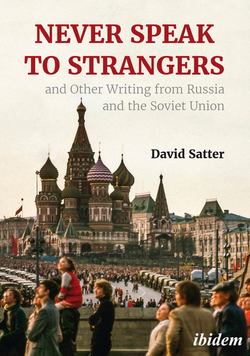Читать книгу Never Speak to Strangers and Other Writing from Russia and the Soviet Union - David Satter - Страница 10
На сайте Литреса книга снята с продажи.
ОглавлениеERZEUGT DURCH JUTOH - BITTE REGISTRIEREN SIE SICH, UM DIESE ZEILE ZU ENTFERNEN
Chicago Daily News, Sunday, February 5–6, 1977
Angry Russians Can’t Understand Inflation
Russians are reacting with black anger and streams of curses to the news that major price increases go into effect April 1.
Unlike Americans, who accept inflation as only a little less inevitable than death and taxes, Russians are told continually that Soviet society eliminates such capitalist evils as rising prices and unemployment.
So when it was announced last month that cab fares would go up 100 per cent, air fares would increase by approximately 20 per cent and sea and river transport and made-to-measure suits would also be more expensive, the reaction of many Russians was that they were being unfairly squeezed.
"In your country when prices go up,” said Volodya M., a physicist in his late 50s, “salaries go up, too. But in some Soviet professions, salaries haven’t been increased in years.”
There had been rumors since last summer that major price increases were on the way, but Russians, wise to the ways of their government, realized the rumours were true when the press announced in December that the government was increasing salaries.
The salary increases averaged 4 rubles ($5.32) a week for 31 million low- and middle-income employees, and were presented as another step forward in improving the Soviet citizens standard of living.
On closer examination, however, it was clear that the salary increases only took immediate effect in the far north, Far East, and Siberia and were consistent with the established Soviet policies of paying differentials to attract workers to cold and remote areas.
The price increases, however, apply uniformly throughout the Soviet Union and will go into effect this spring.
The reaction of the Soviet public was angry and swift. “Khrushchev said we would have communism by 1980,” said one disgruntled young father bitterly, "yet our life gets worse and worse.”
On the street, people grumbled about the increases, which were the first announced major price increases for basic services or commodities for many years, and said that they feared that more increases were on the way.
“Believe me,” said one young secretary, “this is just the beginning.”
The news of price increases had a demoralizing effect, in part because the Soviet assertion to be an inflation-free society contains a great amount of truth. Prices have increased less than 1 per cent a year, according to Soviet statistics, and almost all basic costs such as for food, municipal transport, rent and utilities have not risen in decades.
This, however, does not mean that the Soviet Union is a shopper’s paradise. The average wage in the Soviet Union now stands at about 150 roubles (about $200) a month and a new winter coat can easily cost that much. A new Soviet Zhiguli automobile costs an average Soviet citizen four years’ salary.
When the price increases were announced, Nikolai Glushkov, the chairman of the state committee on prices, said they were necessary because the additional cost of re-equipping the taxi fleet, civil aviation and the sea and river fleet had caused many enterprises to operate at a loss.
Such logic would appeal to any capitalist, but the difficulty with such reasoning, at least as far as the Soviet consumer is concerned, is that it can be extended indefinitely. The prices of many goods in the Soviet Union are kept artificially low. Last year, the government spent 19 billion roubles, for example, to subsidize the sale of meat and milk at stable retail prices.
If the Soviets decide to begin applying a little capitalist logic to other areas of the economy, perceptible inflation could become even more worrying in the Soviet Union than it is in the West because it would erode the floor of stable prices on which hopes for better Soviet living standards have always been based.
In that case, Soviet consumers might have to learn to fulfil the expectations of a Moscow cabbie who, when asked how he thought people would react to the new doubled cab fares, said, “They’ll get used to it.”
